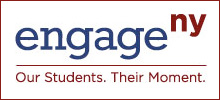11.1 - Colonial Foundations
From EngageNY
European colonization in North America prompted cultural contact and exchange between diverse peoples; cultural differences and misunderstandings at times led to conflict. A variety of factors contributed to the development of regional differences, including social and racial hierarchies, in colonial America.11.1a Contact between Native American groups and Europeans occurred through cultural exchanges, resistance efforts, and conflict.
- Students will trace European contact with Native Americans, including the Dutch, the English, the French and the Spanish.
- Students will examine the impacts of European colonization on Native Americans, who eventually lost much of their land and experienced a drastic decline in population through diseases and armed conflict.
- Students will examine the impacts of geographic factors on patterns of settlement and the development of colonial economic systems.
- Students will examine the factors influencing variations in colonial social structures and labor systems.
- Students will analyze slavery as a deeply established component of the colonial economic system and social structure, indentured servitude vs. slavery, the increased concentration of slaves in the South, and the development of slavery as a racial institution.
- Students will examine colonial political institutions to determine how they were influenced by Enlightenment ideas, British traditions such as the Magna Carta, and the colonial experience.
- Students will examine colonial democratic principles by studying documents such as the Mayflower Compact and the Maryland Toleration Act of 1649, colonial governmental structures such as New England town meetings and the Virginia House of Burgesses, and the practice of the right of petition in New Netherland.
Learn more on Engage NY
EngageNY.org is developed and maintained by the New York State Education Department (NYSED) to support the implementation of key aspects of the New York State Board of Regents Reform Agenda.
This is the official web site for current materials and resources related to the Regents Reform Agenda. The agenda includes the implementation of the New York State P-12 Common Core Learning Standards (CCLS), Teacher and Leader Effectiveness (TLE), and Data-Driven Instruction (DDI). EngageNY.org is dedicated to providing educators across New York State with real-time, professional learning tools and resources to support educators in reaching the State’s vision for a college and career ready education for all students.














